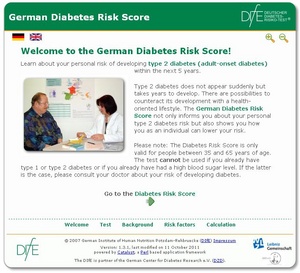Deutscher Diabetes-Risiko-Test® German Diabetes Risk Score

- Description:
The German Diabetes Risk Score, developed by the German Institute of Human Nutrition (DIfE), is a risk prediction tool for type 2 diabetes mellitus. You are asked to provide basic information about your health, physical activity, diet and lifestyle, which takes only a couple of minutes. Based on your answers, the tool informs you about your risk of developing type 2 diabetes mellitus over the next 5 years and also shows you how you can lower your risk. The Diabetes Risk Score is only valid for people between 35 and 65 years of age. The test cannot be used if you already have type 1 or type 2 diabetes or if you already have had a high blood sugar level.
- Service URL:
- http://www.dife.de/
- Agency Responsible:
- Deutsches Institut fuer Ernaehrungsforschung Potsdam-Rehbruecke (DIfE) - German Institute of Human Nutrition.
Details
- Format:
- Website.
- Intervention Type:
- Educational (primarily educational material or psychoeducation).
- Course Length:
- Short (less than 1 module or equivalent). Brief screening tool
- Support Option:
- Automated only.
Target Audience
- Primary Category:
- Diabetes.
- Target Audience:
- Adult. Aged between 35 and 65 years of age
- Languages:
- English and German. The website is available in both German and English and the hardcopy questionnaire is also available in Arabic.
Access
- Fee:
- Free.
- Access:
- Open: No registration required.
- Contact Details:
Research evidence
- Research Trials:
- 3
- Research RCTs:
- 0
- Outcome Summary:
In the first validation study of the German Diabetes Risk Score, the tool was found to accurately estimate the 5-year probability of developing diabetes in Caucasian study populations from Germany. It may therefore represent a useful screening tool for identification of individuals who would benefit from diet and lifestyle changes or medication. The German Diabetes Risk Score might also be useful as a screening tool to identify undiagnosed diabetes.
Moreover, further investigations into the validity of the measure have drawn on sub-sets of these original study populations. One such investigation provided further evidence of associations between the Risk Score and various risk factors of diabetes - supporting its predictive power. Another similar investigation found that combining the Risk Score with biological measures (such as measures of glucose) increases the tool's predictive power. Thus, there is evidence that the tool both alone and in conjunction with other measures may provide accurate estimates of diabetes risk - but its effectiveness remains to be proven among non-German populations.
- Recommended rating, reviewer 1:

- Recommended rating, reviewer 2:

Read more about Beacon's Smiley Rating System.
Research paper citations
Efficacy studies:
Schulze, M. B., Hoffmann, K., Boeing, H., Linseisen, J., Rohrmann, S., Möhlig, M., Pfeiffer, A. F., Spranger, J., Thamer, C., Häring, H. U., Fritsche, A., Joost, H. G. (2007). An accurate risk score based on anthropometric, dietary, and lifestyle factors to predict the development of type 2 diabetes. Diabetes Care, 30(3), 510-515.
Schulze, M.B., Boeing, H., Häring, H. U., Fritsche, A, Joost, H.G. (2008) Validierung des Deutschen Diabetes-Risiko-Scores mit metabolischen Risikofaktoren für Typ-2 Diabtetes (Validation of the German Diabetes Risk Score with metabolic risk factors for type 2 diabetes). Dtsch. Med. Wochenschr, 133, 878-883.
Schulze, M. B., Weikert, C., Pischon, T., Bergmann, M.M., Al-Hasani, H., Schleicher, E., Fritsche, A., Häring, H. U., Boeing, H., Joost, H. G. (2009). Use of Multiple Metabolic and Genetic Markers to Improve the Prediction of Type 2 Diabetes: the EPIC-Potsdam Study, 32 (11), 2116-2119.
Additional references:
Holmberg, C., Harttig, U., Schulze, M. B., & Boeing, H. (2011). The potential of the Internet for health communication: the use of an interactive on-line tool for diabetes risk prediction. Patient Education and Counseling, 83(1), 106-112.
User ratings
User ratings and comments are moderated in order to assure the quality of the submissions. It might take a week for your rating to show up.
Your rating
Login to rate this service.
Other user ratings
No ratings for this service yet.
Last Updated: October 30th 2012

 Home
Home
 Categories
Categories Diabetes
Diabetes